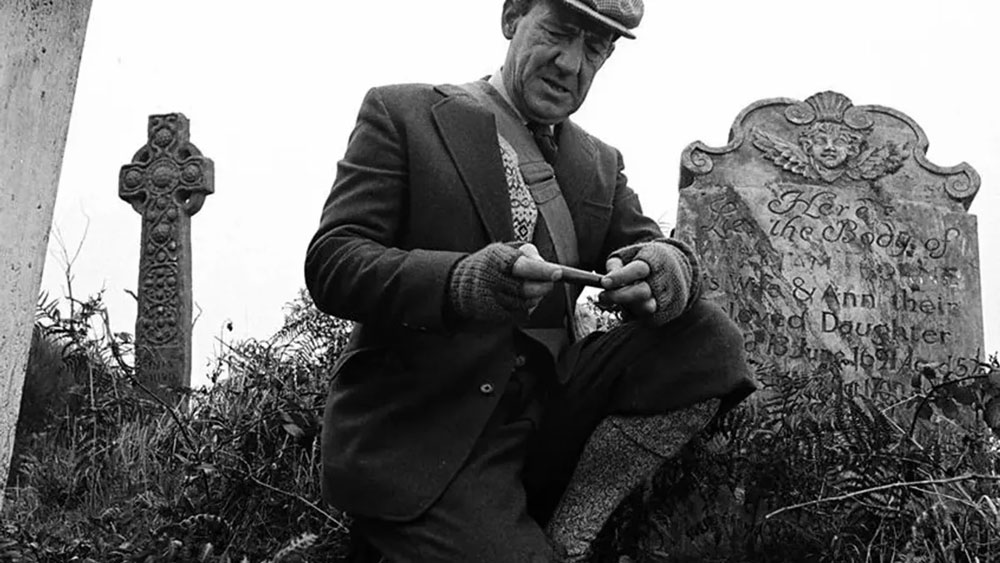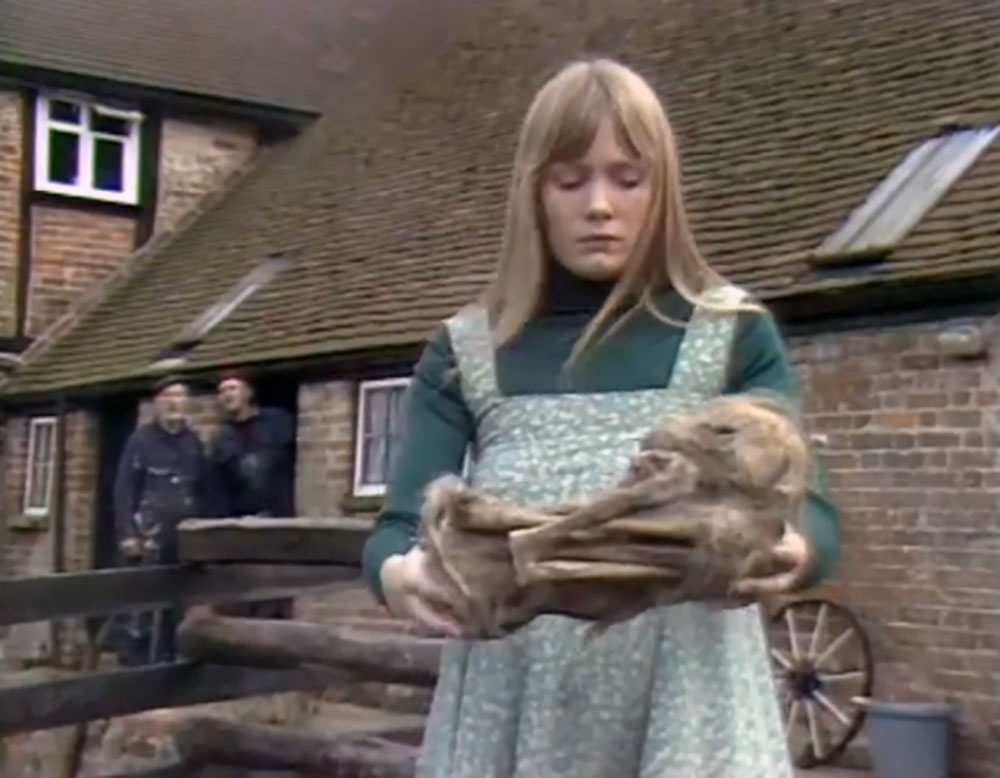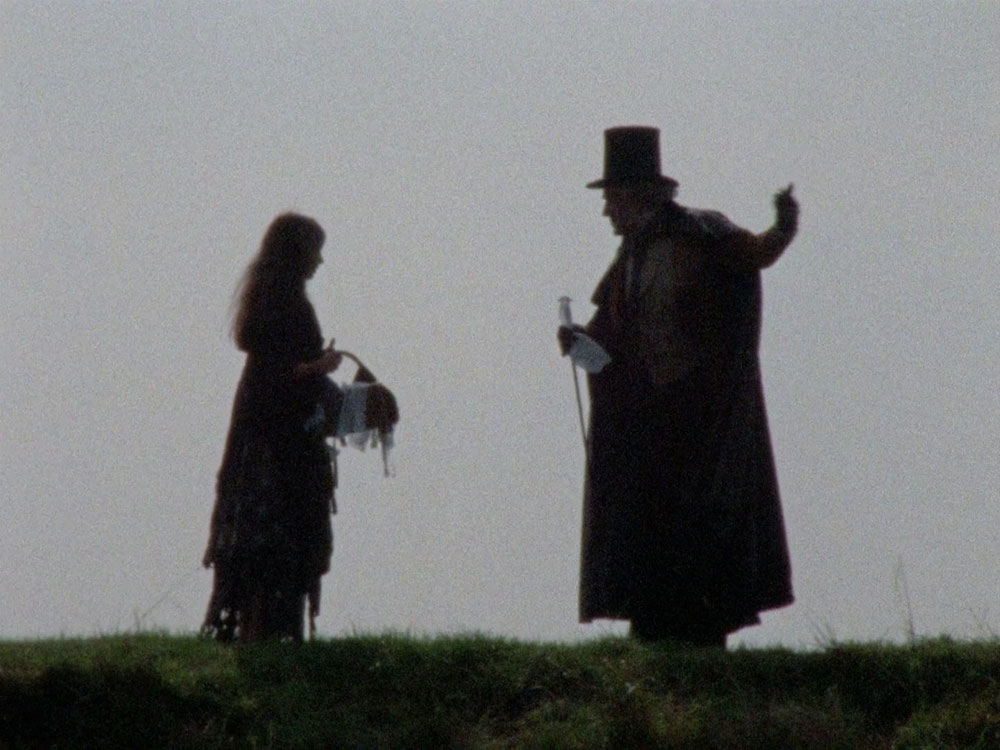I have a confession to make: in my preteen years, I had a bit of an Anglophilic streak. I devoured the BBC’s Agatha Christie series Poirot via box-sets which I received for Christmas, and I obsessively checked out Gothic horror novels from the library. I thought that impulse was behind me until Spectacle announced their December marathon “The Ghosts of British Television,” programmed by Ben Harris. After May’s gialli marathon, I promised myself I would never again spend 12 hours in a dark theater. But in my hubris, I decided to embark on a cinematic journey that would inevitably send me spiraling toward seasonally-appropriate madness.
The British tradition of telling ghost stories for Christmas may seem strange to Americans, with their proclivity toward cheery Rankin/Bass holiday specials, but it has its roots in the Victorian horror tales written by M. R. James and even Charles Dickens’ transculturally popular A Christmas Carol. The BBC revitalized this storytelling convention in 1971 with the annual series A Ghost Story for Christmas, which has continued to run on-and-off since its inception. The format proved so popular that horror anthologies became a staple of British made-for-television movies.
Harris split the all-day screening into six blocks, each containing two or three episodes. The first film of the day is one of the genre’s more famous titles: Omnibus’s “Whistle and I’ll Come to You” (Jonathan Miller, 1968). The opening line, spoken by protagonist Professor Parkins, describes my mindset going into this marathon: “A man’s reason can be overthrown when he refuses to acknowledge those forces inside himself which he cannot understand.” Or she. “Whistle” is tonally silly, but at times it’s genuinely chilling—the sentient bed sheets that haunt the professor are nightmarish. Harris paired this classic with two lesser-known episodes: “Treasure of Abbot Thomas” (Lawrence Gordon Clark, 1974) and “Lost Hearts” (Clark, 1973, pictured at top), both of which ran as part of the BBC’s A Ghost Story for Christmas series.

If the first block of films was a cautionary tale about the dangers of skepticism and/or alchemy, the second block is about people being terrorized by their environment. It’s a common horror framework, but both “The Lake” (Lindsey C. Vickers, 1978) and the Hammer House of Mystery and Suspense episode “Child’s Play” (Val Guest, 1984) are unique examples of this trope. The latter was my favorite film of the day; it features the only American actor in the program, Mary Crosby. It’s a simple yet maddening premise: a stressed British husband and his blaseé American wife are trapped in their house by concrete walls. The worst part? Their daughter has started to act like the quintessential Creepy Horror Child. The ending is truly a twist, proclaiming the hilarious epitaph: “This story is true. It has simply been told before its time.”
Four hours in and that familiar movie-marathon derangement starts to hit. My companion offers me Swedish Fish to calm me down. Luckily, the next film is all about going insane in an enclosed space. Having first aired as part of the series Dead of Night, “The Exorcism” (Don Taylor, 1972) is a fairly standard spooky dinner-party story until the last five minutes, when one of the characters delivers a harrowing monologue about starvation in extreme close-up. “Casting the Runes” (Lawrence Gordon Clark, 1979) is much tamer by comparison, but I found it deliriously funny that one of the plot devices relies on an airport that lets anyone pretend to work there.
When Harris announces the 6 p.m. selection (and the day’s only feature-length film), most everyone has left for a dinner break. Not I, though—because I am dedicated to the experience, and also because I lost my wallet at the Anthology Film Archives holiday party the night before, forcing me to subsist on stale Milano cookies, a banana, and a PB&J. I have accepted my fate at this point; I live here now. I should have sublet my apartment.
I am glad not to miss the BBC rendition of the very popular novel The Woman in Black. My weird familiarity with the tale stems from my aforementioned preteen obsession with all things British, whose manifestations included a crush on Daniel Radcliffe. He stars in the 2012 version of the film, which I saw for my 14th birthday, god bless us everyone. The 1989 BBC version is very cozy and well done, but it also has one of the most deceptively frightening jump scares of any ghost movie I’ve seen. It also depicts my most deeply held desire, which is to be left in an abandoned house for several days so that I can rifle through a stranger’s drawers.

The penultimate block comprises two charming episodes of Nigel Kneale’s horror anthology Beasts (1976), which ran for only one season. We watched the episodes “Baby” and “During Barty’s Party,” and the former was a highlight of the day. When a pregnant young woman and her manic veterinarian husband move into a country cottage, their renovation efforts reveal a decaying, Eraserhead-baby-esque creature in the walls. Simon MacCorkindale, who plays the husband, gives some of the most interesting line readings, including, “Stop woofing, woman!” and a rant in which he encourages his pregnant wife to drink alcohol.
For the last block, Harris goes back to the beginning with two more episodes of A Ghost Story for Christmas: “A Warning to the Curious” (Lawrence Gordon Clark, 1972) and “The Signalman”(Lawrence Gordon Clark, 1976). Both episodes resonate thematically with many other entries in the Ghost Story series, as they center around a fatally nosy outsider who is ultimately defeated by his own desire for knowledge. After 12 hours of made-for-television horror, I felt very aligned with this narrative.
I loved this marathon. It felt like curling up in front of your grandmother’s CRT television on Christmas Eve, trying to fall asleep but instead becoming swept up in whatever her favorite channel had to offer. I had left the gialli marathon with my eyes burning from lurid color and outlandish violence, but I left this one in a state of glad tidings, expecting everyone around me to have a British accent. I only hope that no evil spirits followed me home.



